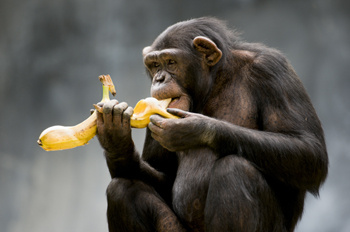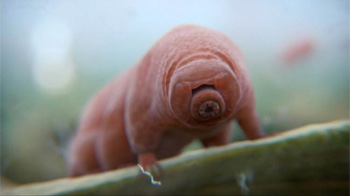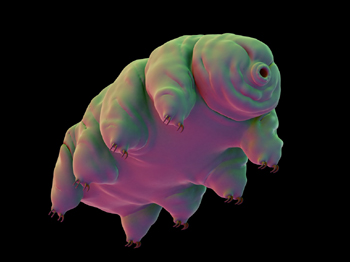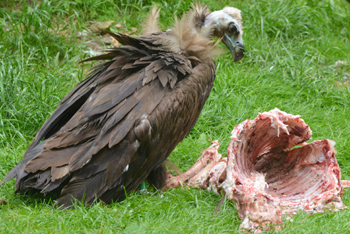7 Species That Will Rule The Earth When We're All Dead

It took us a while, but mankind has finally made its way to the very top of the food chain. With our brick homes, big machines, and assless chaps, humans run this planet. Sure, we might be running Earth straight into the ground, but who's going to stop us -- chinchillas? (Suck it, chinchillas!)
But perhaps a bit of humility is in order. Though it may not look like it, when we're watching funny GIFs of animals being jackasses, plenty of other species are just waiting for us to extinct ourselves as hard as humanly possible -- and some of them might be getting a bit impatient.
Human Greed May Pave The Way For A Squid Supremacy
We expect the species that will be our downfall to be close to us: hyper-intelligent apes, mutant pigs (whose guerrilla tactics will win the Great Bacon Wars), or those damn dog-men of New Mongrowlia. But what if the next great civilization doesn't come from the land, but the sea? No, we're not talking about those arrogant, rapey dolphins, but octopuses, our future aquatic masters. Let's set this ominous scene with the sight of an octopus shoving its entire body through a tiny hole:
The population of cephalopods, whose membership includes octopuses, squids, and cuttlefish, has been blowing up since the 1950s. This is mainly due to overfishing, which has thinned out the fish population to such an extent that cephalopods are starting to fill in the gaps. What these sentient plastic bags have over all other aquatic species is sheer survivability. They tend to thrive when other species falter. This adaptability prompted marine biologist Gretta Pecl to refer to them as the "weeds of the sea," as they're nigh impossible to stamp out.

We thought seaweeds were the weeds of the sea but, hey, we're not the marine biologist here.
Take the Humboldt "jumbo" squid, which lives in the Eastern Pacific waters, a body currently plagued by extreme and rapid climate change. This has caused the water's temperature to keep swinging wildly, wreaking havoc on the local marine wildlife. But not ol' jumbo, which not only managed to use the cooled water to slow its maturation and double its lifespan, but also managed to keep growing, reaching 10 times its normal size. It's almost as if squids are being written by hack sci-fi writers trying to find a reason why their movie monster can't be killed.

One of their only known weaknesses are fireballs shot by Italian-American plumbers.
But if they're just good at fucking and staying alive, why should we ever fear these underwater lab rats? Maybe because, even though cephalopods look like they're the bastard alien offspring of Cthulhu and a beach ball, there are few species that have more in common with us humans. With their large brains (relative to their body size), big and complex eyes, and curious nature, they display quite a "human-like intelligence." They even have eight separate limbs that are dextrous enough to operate tools. Imagine how many goddamn jars you could open with eight completely opposable fingers instead of two hands.
But the same reason they're enjoying a bit of an evolutionary boost might also spell their doom. The fishing industry isn't in a hurry to slow down, so eventually there's going to be a lot more calamari on restaurant menus. As long as we're top dog up here, cephalopods aren't going anywhere, except to a delicious hell of parsley and olive oil.

Sleep with one eye open, future land squid of obscure Discovery Channel TV movie fame.
Chimps Are Just Waiting For Us To Die To Take Over
As far as we can tell, we've only registered self-awareness in apes, cetaceans (dolphins), and elephants -- and only one of those could get into a movie theater in a big raincoat. This puts chimpanzees at the top of the heap. Not only do they possess rudimentary communication and good problem-solving skills, they're even better at remembering number sequences than humans are. But you've read this all before. Hell, there's an entire movie franchise dedicated to the inevitability of us becoming housecats for carefully groomed ape overlords. So instead, let's talk about why we aren't currently fighting a resource war against the empire of Bonobovia.

"We only want to commit genocide against zaftig plumbers. NBD."
Evolutionary niches work in slots. That's why you typically only have one type of fox running around a forest and not one plus a bunch more that look its Chinese knockoffs. Currently, there seems to be only one spot on this planet for a human-like intelligence, and that's being filled by the same species that brought you Cop Rock. Humans and our two-lane-wide civilization are currently holding up the line for all other animals, which remain just as smart as they need in our world. And the really smart chimps? They don't get to aid evolution, they get a cushy gig at a university eating bananas and learning sign language.

Good bananas, too. None of that Del Monte crap.
But guess what? Chimps are tired of waiting. Recently, several heavy stone tools were discovered in West Africa, tools too heavy and crude to have been crafted by the humans that lived there 4,300 years ago. It seems that, over the past few millennia, chimpanzees and other lithe apes have been quietly experiencing their own Stone Age while we've been busy building pyramids and sexting. That may not be much of a concern for us now, but in about 2.5 million years, when we're either fighting the nutrient wars with Gamma Delta 7 or rediscovering fire after our ninth apocalypse, a bunch of chimps with bronze axes is the last thing we need.
Rats Will Just Straight-Up Replace Everything After The Apocalypse
So it's a pretty safe bet to assume that some kind of primate will take over if humans finally blow this global popsicle stand and leave to be dicks in some other galaxy. But what if we go extinct, like the dinosaurs, except that it will definitely be our own fault? Chimps won't stand a chance then, because we'll probably take them down with us. In that case, the next big thing would have to be a scrapper, a survivor, the kind of mammal that, with enough evolution, might have the wherewithal and wisdom to, say, raise a bunch of mutant turtles. Of course, it has to be rats.

"I'm here to melt your heart and inherit your planet."
Jan Zalasiewicz, paleobiologist and author of The Earth After Us, puts his money firmly on rodents taking over after mankind has fucked up one too many times. They are tough and adaptable, and they will eat almost anything. Hell, we couldn't put rats on the endangered species list even if we wanted to. And it hasn't been for a lack of trying, either. Also, even though we might not want to admit it, rats have a lot in common with humans -- especially on a social level, as rat colonies often have the same conflicts (like overpopulation and hunger) and resolutions (like violence and more violence) that you'd find in human societies. Those similarities, according to scholars like Zalasiewicz, probably would not change once they reach the top of the food chain. So maybe, one day in the future, city rats will be scaring other city rats by saying they're never more than 6 feet away from a human.
But taking a shot at the human throne isn't the only thing rats might do after the apocalypse hits. They might just take over everything.


We seriously can't keep up with all these new Pokemon.
Those drawings were imagined by Dougal Dixon, paleontologist extraordinaire and father of the "speculative evolution" literary genre, who believes that one day diverse bands of predatory rats will roam the Earth. But he's not the only one. Though not as sci-fi crazy as Dixon, Zalasiewicz agrees that if the world faced another massive extinction event, there'd be many an "ecological space" to plug up. Left with all the space in the world, rats size would blow up like late career Marlon Brando. And with their high adaptability, rats will also attempt to fill in for every other animal that didn't make it onto the Darwinian ark. In the future, it'll be rats all the way down.
But don't worry. If the rats do get the upper hand, it'll still take anywhere between 3 million and 10 million years for them to take over, so there's really no need to start dumping tributes down the nearest sewer drain. Yet.
Nuclear Radiation Will Make Birds Radiation-Proof
If and when humans finally blow ourselves into our own shadows, nothing will be left but lethal radiation and a whole bunch of pock-ridden mutants and their neighbors, the skeletons. And sweet little tweety birds, who might just be able to thrive in the fallout.

"Feed us radioactive contamination!"
We've already had a little taste of what would happen if we radiation poisoned the Earth like some low-rent Bond villain. The flora and fauna around Chernobyl are still adapting to the fatal meltdown its reactors experienced 30 years ago, but not all creatures are responding to the radiation as was expected. Since then, many biologists have migrated to the edges of Chernobyl (called the exclusion zone) to study the unfortunate wildlife living under the yoke of constant radiation. Among the birds, insects, and spiders chronically exposed to the zone's radiation, there was an increase in DNA damage and a decrease in antioxidants, leading to physical deformities and tumors. However, in 2014, a group (or "parka") of biologists stumbled upon an amazing discovery: Some birds were adapting to the radiation.

So add "nuclear birds" to the list of shit you now have to fear.
Published in the journal Functional Ecology, the study found some small birds that showed a sudden and noticeable adaptation to their radioactive environment. Most birds -- save barn swallows and great tits (ornithologists are the class clowns of the biology department) due to their feathers -- were suddenly displaying "higher levels of protective antioxidants" in their body, improving their body conditions and reducing the oxidative stress caused by radiation. Even more shocking was that the birds living in areas with higher radiation exposure were doing relatively better than their brethren in areas with less exposure. Surely it's just a matter of time before one gets hit with just the right amount of radiation and starts punching gangsters.
Water Bears Are Nigh Indestructible (And Cute, To Boot)
We have built our entire human civilization on the ambition to climb the highest mountain, withstand the coldest tundra, eat the most murderous hot pepper. Those who brave such dangers are seen as heroes, the people we tell stories of long after they've died, prematurely, from doing the reckless shit we loved them for. But there's a species that not only has survived every environment humans have, but is also a million times better at it. Behold, the mighty water bear.

Pictured here looking like a shaved bear's puckering butthole.
Tardigrades, also known as water bears or moss piglets, are only 1mm in size, but they pack a lot of toughness in that small frame. Water bears are ancient, its 1,000+ species first popping up 500 million years ago at the dawn of complex life forms. And while all other complex life forms evolved over those 500 million years, water bears said, "Nah, we're good," and remained tiny and indestructible.
Tardigrades have been known to exist on the peaks of high mountains and at the bottom of seas, being able to survive extreme temperatures ranging from -328 degrees to more than 300 degrees Fahrenheit. They can even withstand pressure up to 6,000 times that of the atmosphere -- like tiny Hulks living in our water. Tardigrades can take that kind of punishment because of their "tun," a unique sort of state that makes them nigh-immortal. In their tun, water bears can dehydrate themselves, creating new kinds of proteins and sugars that can protect their cells against any environmental threat. Not enough oxygen in the water? Stretch out the tun and maximize intake. Temperature below freezing? Give the tun a +5 enchantment against cold to prevent ice from attaching to the cells. They're basically playing reality on God Mode.

Or the D&D players who dump all their points into the Strength attribute.
Not content with watching them thrive in the most inhospitable places on Earth, scientists decided to up the ante. In 2007, European researchers shot thousands of water bears into space, seeing if they could survive the cold and solar radiation for 10 days -- while us puny humans wouldn't last much longer than 15 seconds without protection. Not only did a handful of them manage to survive the radiation, but some females even managed to reproduce, the first generation of Earth creatures created in outer space.
Which actually led some amateur crackpots to believe that water bears were actually aliens to begin with. They are, of course, not aliens. They're just more awesome than we will ever be.

What looks alien about this?
A World-Ending Pandemic Would Be A Smorgasbord For Vultures
When we think of possible species that could take over after we ruin most of the planet, resilience seems to be key. But even the most evolutionarily beneficial traits are worthless if all you have to eat is scorched earth and the corpses of things that sucked more at surviving. And that's where vultures swoop in.

Or waddle in, or whatever the fuck these things do.
Vultures, particularly of the black and turkey kind, are the most perfect carrion-eaters that Mother Nature has produced. Scavenger birds are like slacker geniuses, having figured out the minimum amount of effort for the below average amount of gain. Instead of wasting time competing with either predator or prey, the vulture simply eats whatever other carnivores are unwilling to. If a dead animal is too diseased, decomposed, or gross for other creatures to consume, a vulture will leisurely swoop down, look around, and begin to chow down on its disgusting meal.
But how it eats isn't what makes the vulture special -- it's how it survives what it eats. Dead animals quickly turn into rotting cesspools teeming with toxic compounds, often incubating killers like anthrax. Vultures aren't really bothered by this, as their stomach is 10 times more toxic and virulent than anything it puts in there. Microbiologists have observed that vulture bellies can destroy almost anything, being host to two very hardcore bacteria: Clostridia (which produces toxins also found in botulism) and Fusobacteria (which can be flesh eating) -- which would probably melt other beings from the inside out. They can even use their stomach contents as a chemical weapon, hurling up a chunky biohazard soup to ward off enemies. If vultures were any better at dissolving rotting matter, Walter White would use them to get rid of bodies.

Although they do a pretty good job of that anyway.
As long as there are other creatures to feed on, the vulture will never go without a meal, and as we've all learned from post-apocalyptic fiction, the dumpster diver shall inherit the Earth. Until then, let us be grateful for the vulture, the noble garbage can soaring through the skies, for cleaning up the dead so we don't have to.
Ants Never Stopped Being The Dominant Species
We've seen a lot of contenders for the human throne so far: squids, rats, immortal microscopic bears. But of course, speculating about who will become the dominant species after us humans have left the picture is pointless. Not just because there's no way to scientifically predict the future of our planet, either. No, it's mostly pointless because we're not actually the dominant species. If anyone should be worried about losing their supremacy over the Earth, it's the ants. And, trust us, they're not worried.

"You can't tell because they're black and soulless, but I'm rolling my eyes at you."
When asking the question of which species could best survive an apocalypse, it might be handy to look at one that's managed to overcome one already. Ants, as we know them, have been around for 110 million to 130 million years. That means they were already keeping on keeping on when, about 65 million years ago, the K/T extinction happened, the cataclysmic event that wiped out all of the dinosaurs. And while our puny mammal ancestors hid in dirt holes, the ants thrived. After the big one hit, ants experienced a true golden age, expanding all over the world in a move biologists still call the "greatest success story" of any multicelled animal to date. Today, ants make up more biomass than any other species, including humans. They could literally crush us under their tiny feet. How's that for supremacy?

And you know they don't wipe those tiny feet.
"Sure," you might scoff, "there might be a lot of ants, but we're still the ones with picnics." When it comes to complexity, nothing can beat human society, right? Not really. Ant society has just about all the social trimmings that we have: They have a complex class system and a hive mind capable of tricky logistics, and their armies use actual military strategies. Hell, their civilizations are so varied and complex, they even have room for "pirate" ants, which raid colonies and capture slaves to gather food for them. It's hard to call a species stupid and primitive if their civilizations are more complicated than the average Game of Thrones episode.
Individual ants don't amount to much more than a small spot on a big boot, but their strength lies in their unity. As we speak, a massive war between the California supercolony and the Mexico supercolony rages on just underneath our feet. What's a supercolony? Well, ants have managed to genetically unify colonies spanning entire countries and even continents. Anthills 4,000 miles apart now share the same chemical signals, allowing them to communicate with one another as allies. Put a Japanese ant next to an American one and, if they're in the same supercolony, they will fight side by side as if they've done two tours in 'Nam together. In fact, ants seem to be doing a much better job of uniting their populace than us puny humans have ever managed -- and if they can form nations spanning oceans, who knows how long it would take for a Formic Federal Alliance to pop up?

"According to the referendum, our constituents' main concerns are dropped ice cream cones and soil."
By about any world supremacy metric there is, ants have us beat. They just don't care to brag about it. They've got more important shit to do. Like rule the world.
Cedric, for one, welcomes his new insect overlords and can be found praising their glory on Twitter.
Also check out The 6 Most Badass Murder Weapons In The Animal Kingdom and The 5 Creepiest Serial Killers (Who Were Animals).
Subscribe to our YouTube channel, and check out Why The Cassowary Is The Most Terrifying Animal Ever, and other videos you won't see on the site!
Follow us on Facebook, and let's load up on flamethrowers.